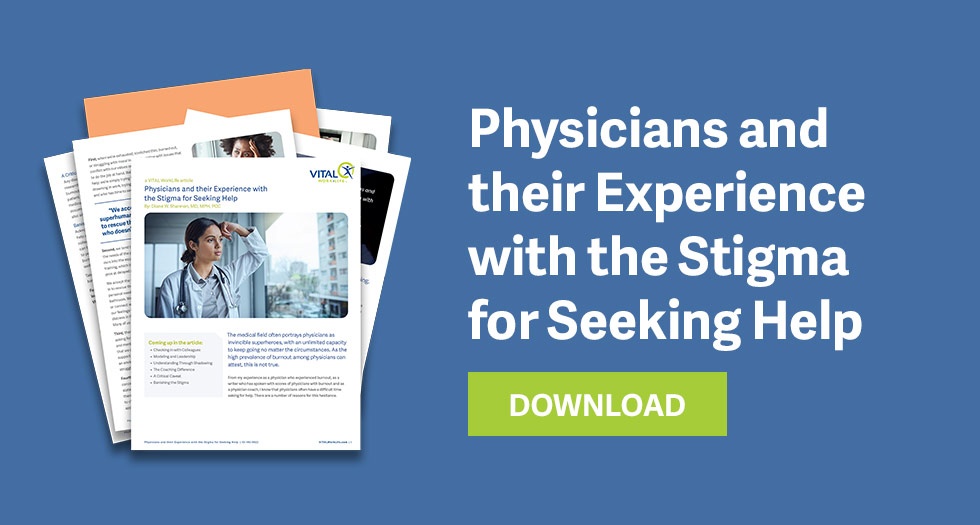The Search for Help.
Dr. Sree Morton was coming to the end of a shift, and the heaviness was upon her. It had been there for the last several weeks, really. It had only been interrupted today by a moment of knotted-stomach anxiety when she had to hurriedly re-titrate an intravenous medication for one of the infants in her NICU. This was quickly followed by a moment of anger when she snapped at Kathy Engel, her nurse practitioner, when Kathy reminded her that she needed to see a critically-ill baby ASAP.
“Kathy, you don’t have to tell me my job.”
The memory of it gave Sree pinpricks of shame and regret. She would need to find the space and energy to apologize. Maybe tomorrow.
The pressure was mounting—two preemies lost in the last year; trouble at home with her husband, David; working double shifts to make up for resignations. On top of those were the realities of modern medicine—required productivity goals, endless medical coding, the insurance stonewalling on treatments she knew were needed…
The heaviness made her say “what’s the point?” in her mind. She didn’t like hearing those words from herself. The point was to heal and help. The point was medicine, the noblest profession she knew of. But that’s not what kept playing on loop in her head.
It was finally time to go home. Maybe David was in the mood to talk. Maybe.
As she turned the corner to the East Corridor of McKee Memorial Methodist hospital (MMM), heading for the lobby, Dr. Kerry O’Hara came out of an elevator.

“Hey, Sree. I was hoping to catch you. Got a second?”
“Sure, Kerry”
Sree was glad to see the woman who had done the most to make her feel welcome at MMM; the one who had guided her while she learned about the real world of hospital pediatrics. Kerry, however, looked somber, maybe worried. She guided them into one of the offices on the second floor to talk. They found one that was open and empty, and Kerry closed the door. So, this was going to be a heavy-duty talk. Sree got a touch of the knotted-stomach feeling.
“Sree,” said Kerry, “I wanted to check in with you about…how you’re doing. We haven’t talked in a while, but some people have come to me and asked me to…check in with you.”
“Well,” said Sree as the anxiety spread within her, “you know, work is work. We’re all treading water.”
“The thing is,” Kerry went on slowly and deliberately, “there’s some concern on the floor that you might be struggling and might need some help.”
“Oh, okay,” said Sree. “I get it. The Thompson baby and the antibiotic drip. I spotted that, so I corrected it.”
“Yes, you did,” said Kerry, nodding. “But there was the Patel case last week, right? And that misdiagnosis with the other preemie. And a couple of late start times. Rich and Kathy said you kind of bit their heads off. Sree, stuff happens, I know, and you are a good physician. But it feels like a pattern, and people are concerned. Frankly, I’m concerned.”
What did she expect, thought Sree, under these circumstances? She held her tongue though, and Kerry went on to say that she wasn’t looking to point a finger. She was a friend concerned. She wanted Sree to know that if she was struggling, she wasn’t alone.
“We’re doctors, Sree,” she said. “We have one of the hardest jobs on the planet. We’re human, but we’re taught—and expected—to be superhuman, but that way of practicing medicine just isn’t going to work anymore. We all need help sometimes, and I just want to know if you need some now.”
By the time the conversation wrapped up and the two physicians had walked to their cars, Sree had felt more indignation, real fear, quite a bit of shame, and, finally, some relief and gratitude. And she had managed to say “yes, I need help.”
During the next week, Sree found time to ask two colleagues, Dr. Lien-sheng Wang and Dr. Omar Hazelton, if they knew where a physician could go if he or she was feeling the burden of work and needed to talk with somebody. She chose Dr. Wang for his nonjudgmental good humor and Dr. Hazelton because he made no bones about denouncing the “superhuman” model of medical practice. She learned both of them had struggled with their own versions of the heaviness; she was indeed not alone.
“Oh yes,” said Dr. Hazelton. “This profession will drive you nuts if you let it. I got so down I wanted out of life, not just medicine. I had to take off my damn Superman suit and go to HR to actually find out what’s available to us. And it turned out that we have peer coaches—physicians like us; they’re people who help us solve problems and set goals and reach them. And they helped me see my strengths. They helped me grab my strengths back from the hole where I’d buried them.”
Dr. Wang told her that MMM had a concierge service—to help stressed practitioners with daily tasks and special occasions, even at home. “When I realized that I couldn’t do everything and be everything to everyone all the time,” he said with a broad smile, “I asked for that help. The concierge took a lot of personal tasks off my plate, and that made a huge difference at a time when I felt like the world was trying to crush me.”
Word must have gotten around that Sree had broken the code of silence about physicians needing help, because in the next couple of weeks, no fewer than four of her colleagues took her aside to tell her how peer coaching had helped them too. One, Dr. Kavery Dutt, also offered to go on a “walk and talk with coffee” if Sree needed to vent about something. “It’s a thing we do in Internal Medicine when somebody needs it,” she said. “Walking and talking has been a really great way for some of us to get a handle on the stressors we are all facing.”
Of course, Sree needed to say something to Kathy Engel about her outburst, and she found a moment when both were at lunch in the hospital café. With the heaviness feeling a bit lighter, at least for the moment, Sree found words to admit she had been out of line.
“It’s just that I’ve been kind of in a black hole recently, Kathy,” she said. “And I’m starting to see that I can dig my way out of it if I get a little help.”
Kathy nodded.
“You know, Dr. Morton,” she said, “I’ve been there. During COVID and all that mess, I went to see Bonnie Kato in HR who connected me with a nurse peer coach in our EAP. She was great, and she helped because she knew and understood what I was going through.”
Kathy had reached out for help? Super-steady Kathy?
“That’s great,” said Sree. “I’m glad you got help. But to be honest, I’ve been on the fence about talking with someone. I don’t think I could go to somebody who works here either. You know—stories make the rounds, and they aren’t always true…”
“That’s for sure,” said Kathy. “I mean, this is difficult stuff, and I was worried about confidentiality. That’s why I loved the confidentiality of our outside resources; I’ve got the contact info if you want it.”
Sree Morton checked her stomach—and her heart—and found only calm there.
“I so appreciate you, Kathy. Thank you. If I ever yell at you again, you’ve got my permission to just say the words ‘I’ve got this number if you need it.’ Okay?”
“Okay,” said Kathy, with a thumb-up sign.
Sree now had several names to contact for help, and she knew she needed to use them, even if she was still a bit skeptical.
The story continues in part three, when Dr. Morton finds herself on the other side of the heaviness and her newfound passion in advocating for physician well being and her efforts in destigmatizing physicians' need for seeking help.
For more on The Stigma for Seeking Help in Healthcare and how to help fight and dismantle it, read our article, Physicians and their Experience with the Stigma for Seeking Help.



